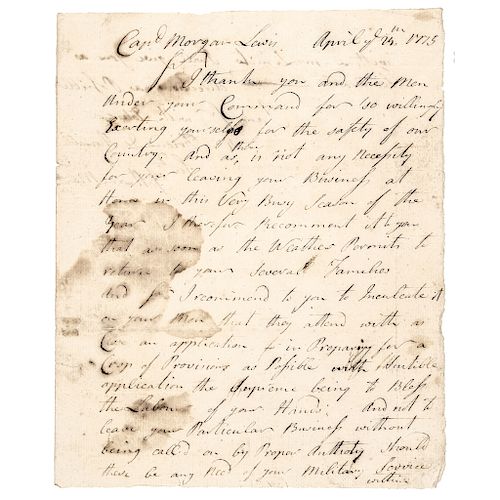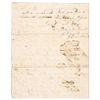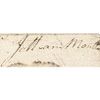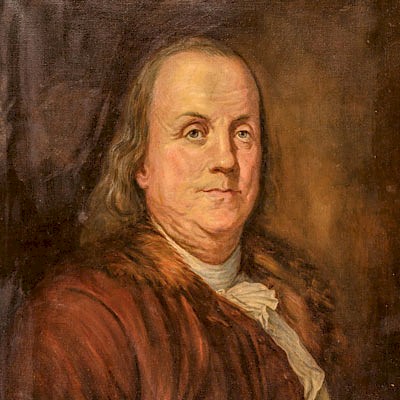April 24th 1775 ALS of General JONATHAN MOULTON of New Hampshire History
Lot 138
Estimate:
$22,000 - $28,000
Absentee vs Live bid
Two ways to bid:
- Leave a max absentee bid and the platform will bid on your behalf up to your maximum bid during the live auction.
- Bid live during the auction and your bids will be submitted real-time to the auctioneer.
Bid Increments
| Price | Bid Increment |
|---|---|
| $0 | $10 |
| $200 | $20 |
| $300 | $25 |
| $500 | $50 |
| $1,000 | $100 |
| $2,000 | $200 |
| $3,000 | $250 |
| $5,000 | $500 |
| $10,000 | $1,000 |
| $20,000 | $2,000 |
| $30,000 | $2,500 |
| $50,000 | $5,000 |
| $100,000 | $10,000 |
| $200,000 | $20,000 |
| $300,000 | $25,000 |
| $500,000 | $50,000 |
About Auction
By Early American History Auctions
Aug 24, 2019
Set Reminder
2019-08-24 12:00:00
2019-08-24 12:00:00
America/New_York
Bidsquare
Bidsquare : Autographs, Colonial Currency, Political Americana, Historic Guns
https://www.bidsquare.com/auctions/early-american-history-auctions/autographs-colonial-currency-political-americana-historic-guns-4347
Historic Autographs • Colonial Currency • American Civil War Colonial Era • Revolutionary War • Political Americana • Black History Early American History Auctions auctions@earlyamerican.com
Historic Autographs • Colonial Currency • American Civil War Colonial Era • Revolutionary War • Political Americana • Black History Early American History Auctions auctions@earlyamerican.com
- Lot Description
American Revolution
April 24th 1775 Autograph Letter by General "Jonathan Moulton" Legendary In New Hampshire History Written Five Days After the Battles at Lexington and Concord... "I thank you and the Men under your Command for so willingly Exerting yourselfs for the safety of our Country."
JONATHAN MOULTON (1726-1787). American Revolutionary War Brigadier General who also played an important role in the early history of New Hampshire, and many tales of his adventures would become Legendary.
April 24, 1775-Dated, Remarkable Content, Revolutionary War Autograph Letter Signed, "Jonathan Moulton," 1 and 1/2 pages (written front and back), measuring 7.75" x 6.25", no place, About Very Fine. Written Just FIVE DAYS After the BATTLES at LEXINGTON GREEN and CONCORD BRIDGE (April 19th, 1775) and "The Shot Heard Round The World".
Here, (then) Colonel Jonathan Moulton is thanking Captain Morgan Lewis and his minutemen for "so willingly Exerting yourself for the safety of our Country." Captain Morgan Lewis was from the town of Sanford, who Marched with his Minutemen in response to the alarm of April 19, 1775. Deckled edges, some light water stains along the left side, with the written text spread in places still legible, upon fine quality period watermarked laid paper. Written five days after the Battles at Lexington and Concord, Moulton is thanking Captain Morgan Lewis and his men for "so willingly Exerting yourselfs for the safety of our Country." This historic date Autograph Letter reads, in full:
"Capt. Morgan Lewis --- April 24th 1775 --
Sir, - I thank you and the Men under your Command for so willingly Exerting yourselfs for the safety of our Country, and as there is not any necessity for your leaving your Business at Home in this Very Busy Season of the Year. I therefore Recommend it to you that as soon as the Weather Permits to return to your Several Families and Sir, I recommend to you to Inculcate (Inoculate) it on your Men that they attend with as Close an application in Preparing for a Crop of Provisions as Possible with Suitable application the Supreme being to Bless the Labour of your Hands; and not to leave your Particular Business without being called on by Proper Authority should there be any need of your Military Service within my Limits. I will give you as Seasonable directions as Possible. -- I am with Esteem, - Yr Friend & Humble Sevt - (Signed) Johnathan Moulton."
Moulton's Regiment of Militia, also known as the 3rd Regiment of New Hampshire Militia, was first called up in April 1775 at Hampton, New Hampshire under the command of Col. Jonathan Moulton. This regiment garrisoned the New Hampshire seacoast after the British burned the town of Falmouth, Maine, then part of Massachusetts. The regiment had a twenty four hour look-out at Little Boar's Head in North Hampton, New Hampshire. There, all the coastal shipping could be watched, and could provide warning to the local area in case of attack.
Col. Moulton would later lead the regiment in the Saratoga Campaign, joining General John Stark in northern New York. Afterwards, the regiment would spend the rest of the American Revolutionary War guarding the seacoast of New Hampshire. An exceedingly rare, historic content, early Revolutionary War dated ALS written by an American Revolutionary War Brigadier General, thanking other Minutemen "For so willingly Exerting yourselfs for the safety of our Country"!
Brigadier General Jonathan Moulton (July 21, 1726 - September 18, 1787) played an important role in the early history of New Hampshire and many tales of his adventures would become legendary.
Jonathan Moulton was born in the town of North Hampton, Massachusetts, later called New Hampshire). He spent much of his childhood as an apprentice (Indentured Servant) to a cabinetmaker. In 1745 he won his freedom and left the cabinet making trade. He worked as Silversmith and formed Moulton and Towle Silversmithing Company. He ended up leaving the Silversmithing trade to his partner and it is still called Towle Silversmithing Company today, where they still manufacture silverware and kitchen utensils.
He was appointed as a captain of a ranger company in the New Hampshire Militia. In the same year, he was with the New England army under the command of William Pepperrell that took Fortress Louisbourg from the French. For the rest of King George's War, Moulton fought against the Ossipee Indians that were allied to the French around Lake Winnipesaukee until they were killed or driven to Canada.
During one Winter, a scout from Dover, New Hampshire, Capt. Moulton and his men ambushed six Ossipee warriors on the ice of Lake Winnipesaukee. Five of the warriors were killed in the first volley and the sixth ran away, followed closely by Moulton's massive black dog that attacked and killed the fleeing warrior. The Treaty of Aix-la-Chapelle ended the war in 1748. It would be only six years until the next war between Britain and France.
With the resumption of the colonial struggle in 1754, with the French and Indian War, Moulton once again served as a captain in the New Hampshire Militia and was elected to the New Hampshire General Court.
After the end of the French and Indian War, Moulton was granted large tracts of land on the north side of Lake Winnipesaukee in the towns of Moultonborough (named after himself), New Hampton, Tamworth, Center Harbor and Sandwich, by the governors Benning Wentworth and John Wentworth.
In 1764 with the wreck of the mast-ship St. George off the coast of Hampton, Moulton and many of the other town residents salvaged many of the goods aboard her for their own profit.
In the early morning hours of March 15, 1769, Moulton's mansion burned to the ground. This fire helped to start one of the most interesting legends about him as the "Yankee Faust".
During the events that led up to the American Revolution, Jonathan Moulton was elected as moderator of the Hampton town meetings, chosen as a member of the Committee of Safety, appointed as a delegate to the patriot assembly at Exeter, New Hampshire and commissioned as the Colonel of the 3rd New Hampshire Regiment of Militia.
On September 21, 1775, his wife Abigail died of smallpox. A year later, he married Sarah Emery and fathered four more children.
For the first two years of the American Revolutionary War, Col. Moulton's regiment guarded the 18-mile seacoast of New Hampshire against British invasion. But in the fall of 1777 he marched with his men to the Battle of Saratoga in New York and the defeat of Lt. General, John Burgoyne's British army invading from Canada. Col. Moulton and the 3rd New Hampshire Militia served in Gen. John Stark's brigade during the battle. He was promoted to Brigadier General by George Washington who was impressed with his battlefield skills.
After the end of the American Revolution, Moulton continued his role in the New Hampshire militia. On March 25, 1785, he was created Brigadier General of the 1st Brigade of the New Hampshire Militia.
Jonathan was rewarded lands (for his successes during the war) in the lakes region of New Hampshire and founded the town of Moultonborough. He settled in North Hampton, New Hampshire and was one of the first people to paint his house colonial white. This was not a popular decision with some of the local towns people since paint had to be imported from Britain.
Jonathan participated in a feud over farm land with a neighbor which was exacerbated by a series of slanderous editorials written in the Boston Post, Boston's major newspaper at the time. The feud became part of a civil suit in which the judge, a long time friend of the General, ruled in his favor. Mysteriously, the Jonathan's barn was burned down, and no one ever claimed responsibility. He expressed that he was more upset about losing the animals than losing the barn itself, which could be re-built.
Jonathan Moulton died at the age of 71 on September 18, 1787. His body was moved in the middle of the night before burial and his tombstone disappeared. Two years later, in 1789, George Washington stopped and paid his respects to General Moulton's widow Sarah on his tour of the new United States of America.
- Shipping Info
-
Early American provides in-house worldwide shipping. Please contact us directly if you have questions about your specific shipping requirements.
-
- Buyer's Premium



 EUR
EUR CAD
CAD AUD
AUD GBP
GBP MXN
MXN HKD
HKD CNY
CNY MYR
MYR SEK
SEK SGD
SGD CHF
CHF THB
THB













